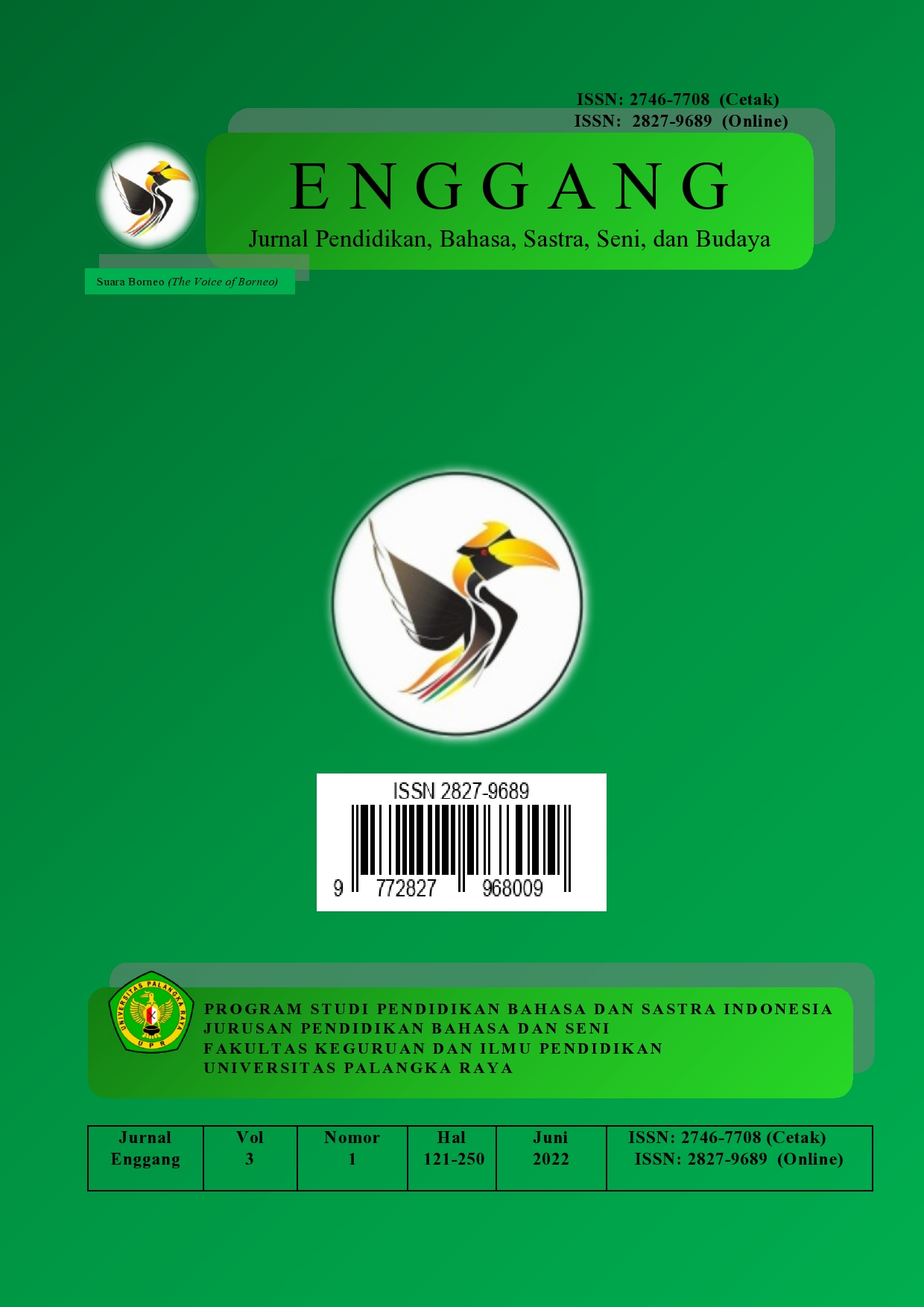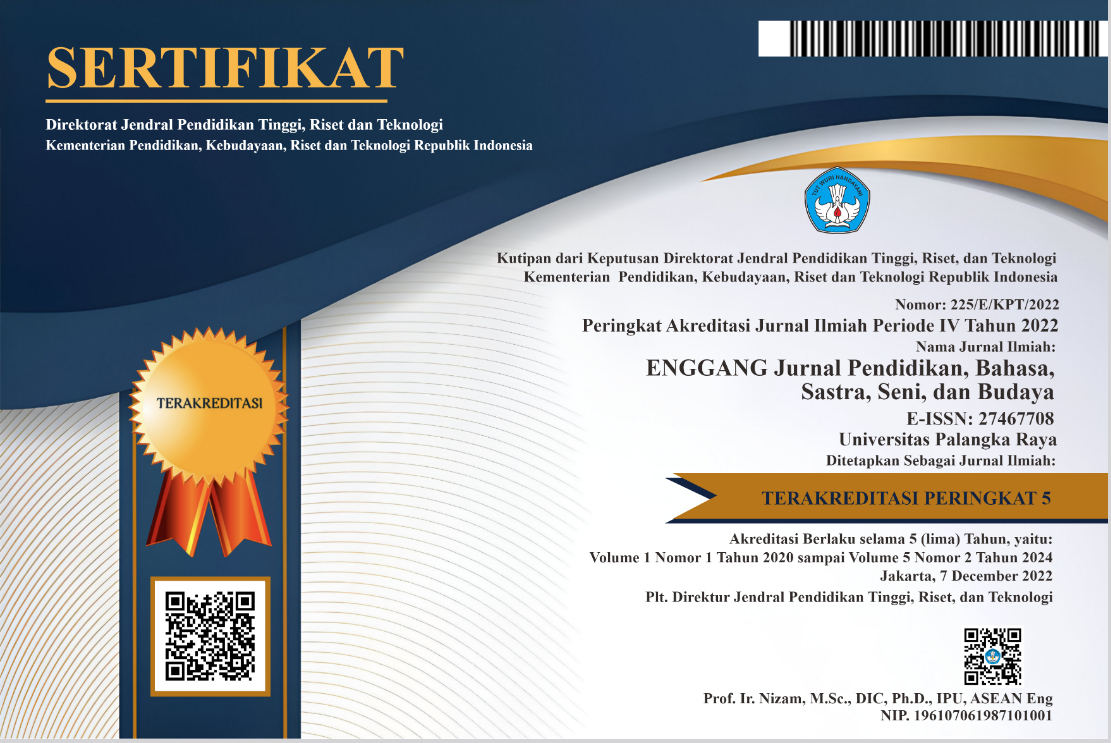Strategi Guru dalam Meningkatkan Mutu Pembelajaran PAI melalui Pemanfaatan Teknologi
DOI:
https://doi.org/10.37304/enggang.v5i2.22183Keywords:
Educational Technology, Islamic Education, Islamic Education Learning Quality, Teacher Strategy, TPACKAbstract
This qualitative phenomenological study aims to explore strategies, supporting-inhibiting factors, and the impact of technology utilization by Islamic Religious Education (PAI) teachers in improving the quality of learning. Data were collected through in-depth interviews with selected PAI teachers and grade 8 students, participant observation of learning, and document analysis (RPP, digital content), the data was then analyzed using thematic analysis. The main supporting factors include the development of Technological Pedagogical Content Knowledge (TPACK) through the PAI Subject Teacher Deliberation (MGMP) and school policy support, while crucial obstacles include infrastructure gaps, student resistance, and ethical dilemmas in the use of AI. The use of technology has a holistic impact on the quality of learning 1) Increased student participation (40%) and critical engagement; 2) Strengthening cognitive understanding (+35% digital ethics analysis) and character (noble morals) (Mulyasa, 2021). This study contributes theoretically through the development of an Islamic values-integrated TPACK model and practically in the form of strategy recommendations for teachers, Islamic Education-specific TPACK training policies for teachers, and the development of sharia-compliant educational applications. The main conclusion confirms that the effectiveness of technology in Islamic Education depends on creative adaptations that synergize pedagogy, Islamic content, and socio-technical contexts.
Downloads
References
Arifin, Z. (2024). Etika digital dalam perspektif pendidikan Islam: Tantangan dan strategi implementasi. Deepublish.
Ausubel, D. P. (1968). Educational psychology: A cognitive view. Holt, Rinehart & Winston.
Birt, L., Scott, S., Cavers, D., Campbell, C., & Walter, F. (2016). Member checking: A tool to enhance trustworthiness or merely a nod to validation? Qualitative Health Research, 26(13), 1802–1811. https://doi.org/10.1177/1049732316654870
Braun, V., & Clarke, V. (2006). Using thematic analysis in psychology. Qualitative Research in Psychology, 3(2), 77–101. https://doi.org/10.1191/1478088706qp063oa
Braun, V., & Clarke, V. (2019). Reflecting on reflexive thematic analysis. Qualitative Research in Sport, Exercise and Health, 11(4), 589–597. https://doi.org/10.1080/2159676X.2019.1628806
Chen, L., et al. (2021). Effects of digital religious education: A meta-analysis. Journal of Computer Assisted Learning, 37(2), 345–359.
Creswell, J. W., & Poth, C. N. (2018). Qualitative inquiry and research design: Choosing among five approaches (4th ed.). SAGE Publications.
Fusch, P. I., & Ness, L. R. (2015). Are we there yet? Data saturation in qualitative research. The Qualitative Report, 20(9), 1408–1416.
Hermawan, C. M., Aprillia, I., Rizky, M. Q., Billah, M. M., Fadhlurrahman, M., & Rosfiani, O. (2024). The effect of using Quizizz learning test media on thematic learning outcomes of class II students at MI Pembangunan UIN Jakarta. Enigma in Education, 2(1). https://www.enigma.or.id/index.php/edu/article/view/38
Hermawan, C. M., Rosfiani, O., Abrar ul Hassan, S., Kuswiyanti, T. S., Sudin, M., & Roswati, S. (2022). Improvement of metacognitive thinking skills in teacher student scientific assignments through the use of online platforms. TARBIYA: Journal of Education in Muslim Society, 9(2). https://journal.uinjkt.ac.id/index.php/tarbiya/article/view/30818/0
Johnson, E. B. (2002). Contextual teaching and learning. Corwin Press.
Kemendikbudristek. (2022). Rapor Pendidikan Indonesia 2022. Pusat Data dan Teknologi Informasi, Kemendikbudristek.
Kementerian Agama RI. (2020). Statistik Pendidikan Islam. Direktorat Jenderal Pendidikan Islam, Kemenag RI.
Kementerian Agama RI. (2023). Panduan implementasi kurikulum Merdeka pada madrasah. Direktorat Jenderal Pendidikan Islam, Kemenag RI.
Kuswiyanti, T. S., Hidantikarnillah, V., Rosfiani, O., & Adiyan, F. (2023). Using artificial intelligence (AI) to improve students’ speaking skills in higher education. Proceedings of the English Education International Conference (EEIC, 3). https://jurnal.usk.ac.id/EEIC/article/view/41081
Lincoln, Y. S., & Guba, E. G. (1985). Naturalistic inquiry. SAGE Publications.
Merriam, S. B., & Tisdell, E. J. (2016). Qualitative research: A guide to design and implementation (4th ed.). Jossey Bass.
Miles, M. B., Huberman, A. M., & Saldaña, J. (2018). Qualitative data analysis: A methods sourcebook (4th ed.). SAGE Publications.
Mishra, P., & Koehler, M. J. (2006). Technological pedagogical content knowledge: A framework for teacher knowledge. Teachers College Record, 108(6), 1017–1054.
Mulyasa, E. (2021). Menjadi guru profesional menciptakan pembelajaran kreatif dan menyenangkan (Edisi revisi). Remaja Rosdakarya.
Neubauer, B. E., Witkop, C. T., & Varpio, L. (2019). How phenomenology can help us learn from the experiences of others. Perspectives on Medical Education, 8(2), 90–97. https://doi.org/10.1007/s40037-019-0509-2













